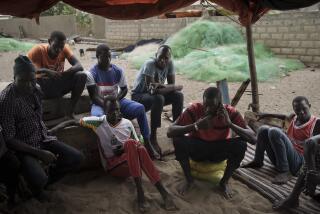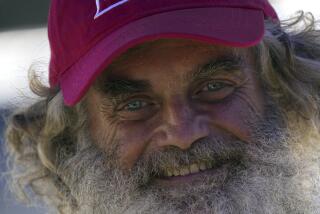Casting call in Tierra del Fuego
- Share via
The current is pushy, and my brother, Michael, and I have waded belly-deep. Our felt soles skid intermittently along the gravel bottom. We can’t quite anchor ourselves as we cast toward the opposite bank of Argentina’s Rio Grande in Tierra del Fuego. We should be more careful in such a surging river, but fish are on our minds.
It doesn’t help that we are slightly competitive -- me more than him, though he’s more skilled.
Michael became a fishing guide out of college and now owns a guiding business. Awake or asleep, he dreams of fishing -- and usually, he is fishing. His casts are perfectly timed, deliciously smooth and precise. Mine are less consistent. He doesn’t get tired. I do. I’m his 29-year-old little sister -- a good fisherman too -- and feeling competitive, because wouldn’t it irritate him if I out-fished him just once?
We’re here to catch, fight and feel big, beautiful fish -- then let them slip free from our fingers. We’d all come for our father’s 60th birthday, to catch huge browns and fish as we always have -- to feel together again. Over the years, we’ve blown paychecks to fish for striped bass, brookies, browns, rainbows, redfish, tarpon and salmon.
Yesterday, we flew 1,800 miles south of Buenos Aires, over the Strait of Magellan, landing outside the patchwork town of Rio Grande.
It’s 8 o’clock in the evening, and the cloud-veiled summer sun casts a dull white light over the treeless plains of Isla Grande de Tierra del Fuego. Across the fat, middle section of the island snakes the Rio Grande, reflecting silvery blue, as it winds west, converges in Argentina and flows to the frothy Atlantic. It’s cold and rainy, with wind gusting up to 60 mph. Schools of some of the largest sea-run brown trout on the planet swim upstream every summer. Thanks to commercial fishing restrictions off Tierra del Fuego and strict catch-and-release policies, trout return in ever-increasing ages and sizes. Twenty-pounders are not unusual.
Ten miles from the ocean, we stand amid the rain-swollen Rio Grande, fishing a stretch as wide as a two-lane highway. Runoff has muddied the water into a milky tea. The east wind whips at our rain-flecked jackets. Every so often our lines tangle into clumps at our waists. We cast backhanded to avoid ricochets from weighty flies.
There are realities of our fishing together of which only I am aware: Michael doesn’t know that I compete with him, which is fine; I am a private and lazy competitor, competing only when I feel like it -- often after eating, hardly ever in the morning. When I do, I press my lips together and feel fierce, but for no longer than an hour. There are also hours where I don’t care if I catch anything. Whether it’s a karmic reward for being noncompetitive or dumb luck, it’s often during these dreamy moments when I catch my very biggest fish.
Right now I care. I want a fish. This morning, Michael caught four 15-pounders, fresh from the ocean, with writhing plump silver bodies, an exciting affirmation that the trout had arrived.
But the afternoon hours pass without a tug, bump, nibble -- nothing. I imagine schools of brawny browns swimming around us, rolling their eyes at our poor leech imitations. Or, perhaps the scent of fresh water already sent them spawning without food.
Did we come this far only to miss the fishing window? I slip downstream a little. Frustration builds. I practice swearing in Spanish.
To be continued ...
More to Read
Sign up for The Wild
We’ll help you find the best places to hike, bike and run, as well as the perfect silent spots for meditation and yoga.
You may occasionally receive promotional content from the Los Angeles Times.






